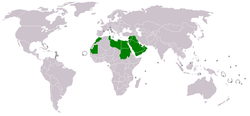United Nations Economic and Social Commission for Western Asia
 Map showing member states of United Nations Economic and Social Commission for Western Asia | |
| Established | August 9, 1973 |
|---|---|
| Type | Primary Organ - Regional Branch |
| Legal status | Active |
| Headquarters | Beirut, Lebanon |
| Website | ESCWA Website |
The United Nations Economic and Social Commission for West Asia (ESCWA) [Arabic]: (الإسكوا), headquartered in Beirut, Lebanon, is one of five regional commissions under the administrative direction of the United Nations Economic and Social Council. ESCWA promotes economic and social development of Western Asia through regional and subregional cooperation and integration. It devises, promotes, and executes development assistance activities and projects in tune with the needs and priorities of the region of Western Asia. ESCWA coordinates its activities with those of the major departments/offices of the United Nations at Headquarters and of specialized agencies and intergovernmental organizations, such as the League of Arab States, the Gulf Cooperation Council and the Organisation of Islamic Cooperation, with a view to avoid duplication and ensure complementarity, synergy and exchange of information. ESCWA has 18 member states (the latest countries to join were Mauritania in 2015;[1] Libya, Morocco and Tunisia in 2012), and reports to the UN Economic and Social Council (ECOSOC).
Vision
In harmony with the universal ideals of the United Nations, ESCWA aspires to induce positive Economic and Social change for lasting development in the Arab region.
ESCWA works in partnership with the governments of the region and inspires citizens to harness their inherent potential to build a solid foundation for progress and prosperity.
Objectives
To support economic and social development in the countries of the region;
To promote cooperation between the countries of the region;
To encourage interaction between member countries and promote the exchange of experience, best practice and lessons learned;
To achieve regional integration between member countries, and to ensure interaction between Western Asia and other regions of the world;
To familiarize the outside world with the circumstances and needs of the countries in the region.
Mission
ESCWA is dedicated to the advancement of the Arab region. It acts as a catalyst for the realisation of pioneering Economic and Social development programmes. It spurs cooperation, develops innovative strategies, and promotes pragmatic policies.
ESCWA acts as a think tank and platform for dialogue which promotes partnerships across the region.
ESCWA mobilizes the support of stakeholders and key players from official institutions and civil society, towards the common goal of improving human life.
History

The United Nations Economic and Social Commission for Western Asia (ESCWA) was first established in 1973 as the UN Economic Commission for Western Asia (ECWA). It was established by Economic and Social Council resolution 1818 (LV) and was the successor to United Nations Economic and Social Office in Beirut (UNESOB). The organization's name was changed from Economic Commission for Western Asia (ECWA) to Economic and Social Commission for Western Asia (ESCWA) in 1985.
Former ESCWA Executive Secretaries:
Bader Al-Dafa 2007 - 2010
Mervat Tallawy 2000 - 2007
Hazem El Beblawi 1995 - 2000
Sabbaheddin Bakjaji 1993-1995
Tayseer Abdel Jaber 1989-1993
Mohammad Said Al-Nabulsi 1985-1988
Mohammad Said Al-Attar 1974-1985
Member states
 Bahrain
Bahrain Egypt
Egypt Iraq
Iraq Jordan
Jordan Kuwait
Kuwait Lebanon
Lebanon Libya
Libya Mauritania
Mauritania Morocco
Morocco Oman
Oman Palestine
Palestine Qatar
Qatar Saudi Arabia
Saudi Arabia Sudan
Sudan Syria
Syria Tunisia
Tunisia United Arab Emirates
United Arab Emirates Yemen
Yemen
Locations
ESCWA headquarters is in Downtown Beirut, Lebanon, near the Grand-Serail – the headquarters of Lebanese Prime Minister – and the Parliament.
Funding
The administrative budget of ESCWA is funded from the financial resources of the United Nations, the major portion of which comes from the contributions of member States. Detailed expenditures are allocated to various sections for pre-determined purposes.
Furthermore, ESCWA receives additional financial resources from outside the regular budget, which are used to implement specific projects in accordance with agreements reached with governmental and non-governmental donors. The amount of these resources varies from one period of time to another, depending on numerous considerations and circumstances.
See also
- United Nations System
- United Nations Economic Commission for Africa (overlaping membership)
References
Bibliography
- Paul Berthoud, A Professional Life Narrative, 2008, worked with UNESOB and offers testimony from the inside of the early years of the organization.
External links
UN Economic and Social Commission for Western Asia
33°53′41″N 35°30′08″E / 33.8946°N 35.5021°E Template:ESCWA
